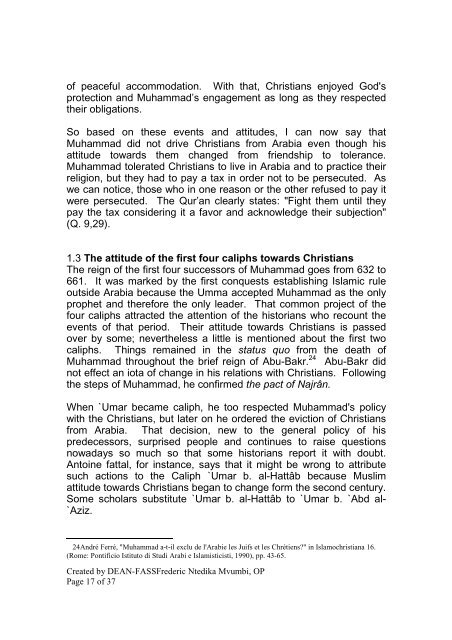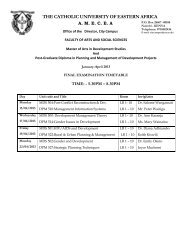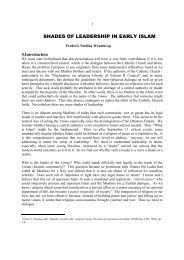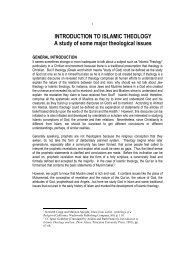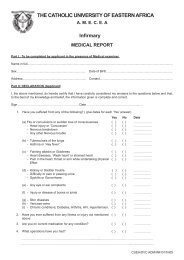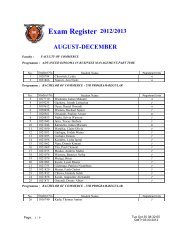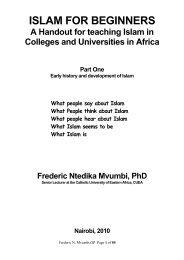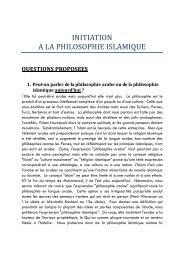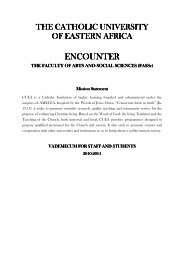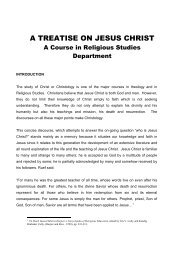PRINCIPLES FOR INTERRELIGIOUS DIALOGUE.pdf - CUEA
PRINCIPLES FOR INTERRELIGIOUS DIALOGUE.pdf - CUEA
PRINCIPLES FOR INTERRELIGIOUS DIALOGUE.pdf - CUEA
Create successful ePaper yourself
Turn your PDF publications into a flip-book with our unique Google optimized e-Paper software.
of peaceful accommodation. With that, Christians enjoyed God's<br />
protection and Muhammad’s engagement as long as they respected<br />
their obligations.<br />
So based on these events and attitudes, I can now say that<br />
Muhammad did not drive Christians from Arabia even though his<br />
attitude towards them changed from friendship to tolerance.<br />
Muhammad tolerated Christians to live in Arabia and to practice their<br />
religion, but they had to pay a tax in order not to be persecuted. As<br />
we can notice, those who in one reason or the other refused to pay it<br />
were persecuted. The Qur’an clearly states: "Fight them until they<br />
pay the tax considering it a favor and acknowledge their subjection"<br />
(Q. 9,29).<br />
1.3 The attitude of the first four caliphs towards Christians<br />
The reign of the first four successors of Muhammad goes from 632 to<br />
661. It was marked by the first conquests establishing Islamic rule<br />
outside Arabia because the Umma accepted Muhammad as the only<br />
prophet and therefore the only leader. That common project of the<br />
four caliphs attracted the attention of the historians who recount the<br />
events of that period. Their attitude towards Christians is passed<br />
over by some; nevertheless a little is mentioned about the first two<br />
caliphs. Things remained in the status quo from the death of<br />
Muhammad throughout the brief reign of Abu-Bakr. 24 Abu-Bakr did<br />
not effect an iota of change in his relations with Christians. Following<br />
the steps of Muhammad, he confirmed the pact of Najrân.<br />
When `Umar became caliph, he too respected Mu .hammad's policy<br />
with the Christians, but later on he ordered the eviction of Christians<br />
from Arabia. That decision, new to the general policy of his<br />
predecessors, surprised people and continues to raise questions<br />
nowadays so much so that some historians report it with doubt.<br />
Antoine fattal, for instance, says that it might be wrong to attribute<br />
such actions to the Caliph `Umar b. al-Hattâb because Muslim<br />
attitude towards Christians began to change form the second century.<br />
Some scholars substitute `Umar b. al-Hattâb to `Umar b. `Abd al-<br />
`Aziz.<br />
24André Ferré, "Muhammad a-t-il exclu de l'Arabie les Juifs et les Chrétiens?" in Islamochristiana 16.<br />
(Rome: Pontificio Istituto di Studi Arabi e Islamisticisti, 1990), pp. 43-65.<br />
Created by DEAN-FASSFrederic Ntedika Mvumbi, OP<br />
Page 17 of 37


